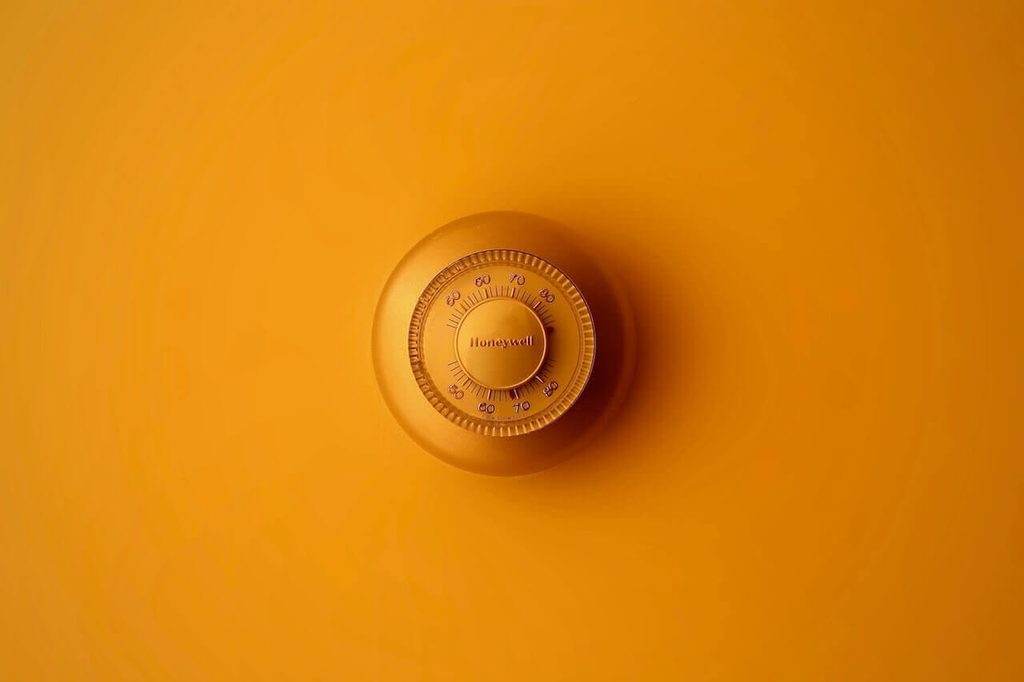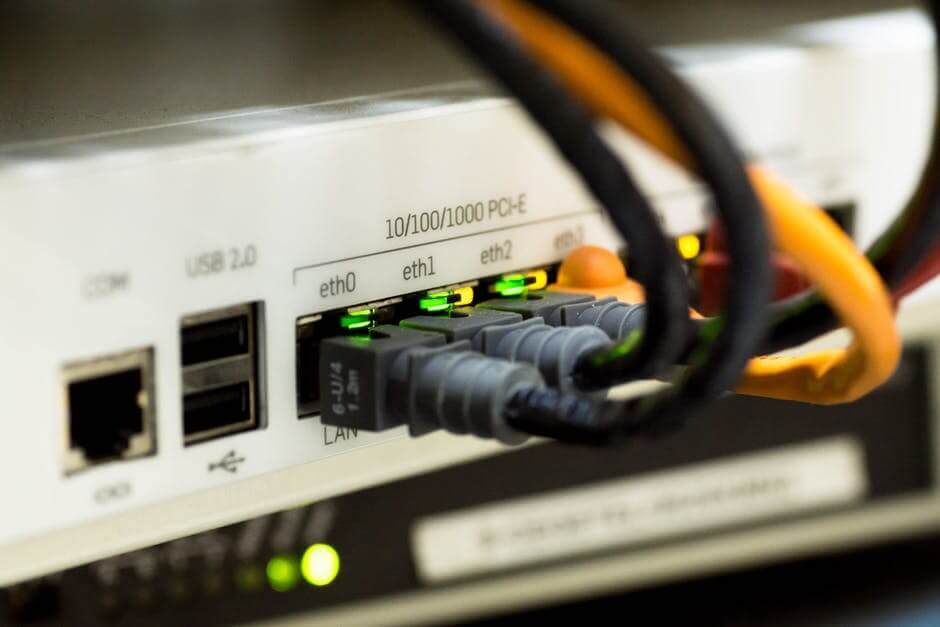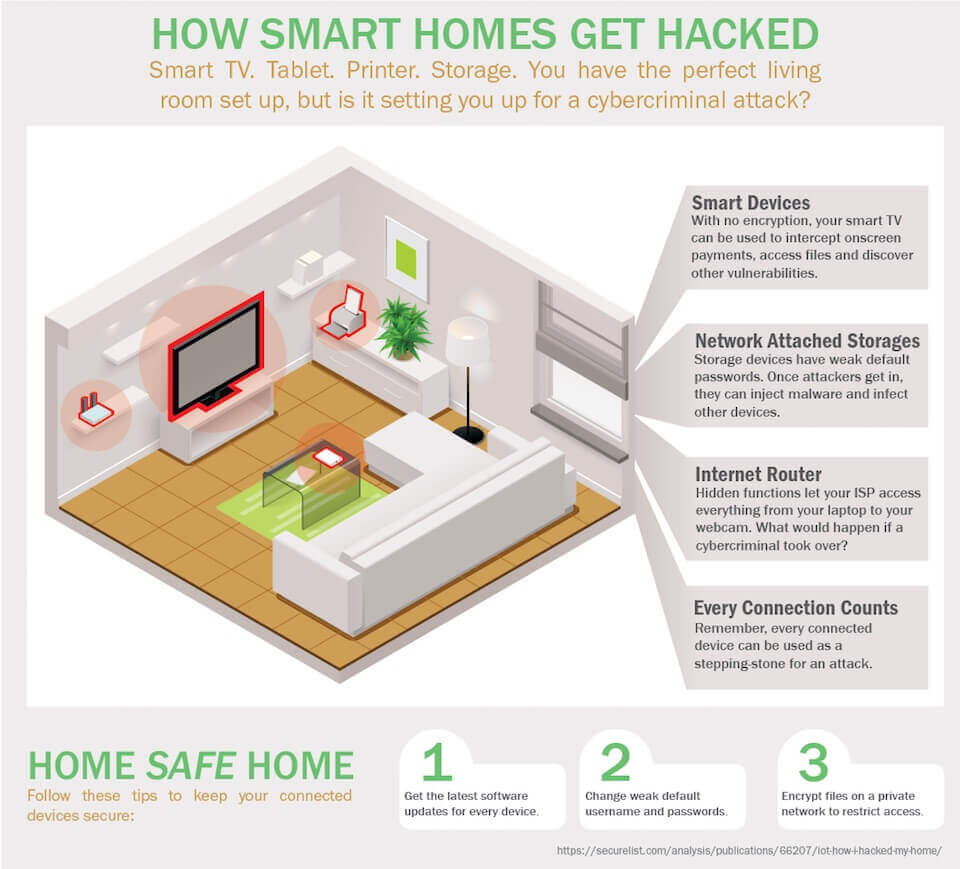Home automation is scary for a few reasons. First things first, the technology can be overwhelming. If you’re interested in building a smart home, understanding where to start and what products to purchase requires a lot of know-how. More than this, though, there are major security issues you need to consider when taking advantage of the Internet of Things.
Before delving too far into this topic, it’s important to understand what defines a smart home. Twenty years ago, a home might have been considered “smart” if it had a tool like a porch light timer. These devices turn on and off front lights at predefined times.
Today, porch light timers look like child’s play in comparison to the options on the market. Modern smart homes take advantage of a variety of complex devices, many of which work together to enhance a user’s overall experience.
In other words, smart homes are filled with gadgets that collect data in an effort to make your life better. For example, one popular modern smart home feature is the Nest thermostat. This software claims to learn from you as you use it more and more.
Basically, it remembers the temperatures you set historically, and it uses this data to make temperature changes for you based on past trends. Another popular advancement in this space is the Amazon Echo, an Alexa-enabled device that can play music, make calls, set alarms, control other smart home devices and more.
Opting to live in a home that’s always the perfect temperature, playing the right music and helping you live a better life seems like a no-brainer, but it’s not necessarily all upsides. Smart homes have major vulnerabilities when it comes to security.
Since everything is connected, a hacker can do a lot of damage if they break into your home’s system. For these reasons and more, it’s important to understand smart home security and how to protect your home devices.
Securing Your Home
Although you may not feel that you live in a smart home, your place of residence may have more Internet of Things devices than you realize. According to a report by PlumChoice, 79 percent of people surveyed in 2016 already owned at least one smart gadget. So, whether you know it or not, you might already own a smart device.
To keep yourself safe and avoid privacy risks and security concerns, there are a few things you can do. First, you’ll want to secure your network. Even if you don’t have smart home devices, you likely have a phone, computer, television or another device that connects to the internet. Every time you use your home’s signal, your private information is at risk.
This is why every home needs to secure their network.
When you get a router, you should change its default admin password. Nearly every router comes with a default username and password. This information is often under attack by hackers who try to break into networks with these common credentials. To keep them out, you can change the default admin password on your home’s router.
If you’re going to create a new password, make sure it is complex and hard to guess. The U.S. government suggests that you keep passwords long, free of common phrases and full of both uppercase and lowercase letters. It’s also a good idea to use symbols in addition to characters in your passwords.
The second measure you can take to improve your security is to understand the devices in your home. As mentioned above, you might have a smart device in your house without even realizing it. To better know your devices, review the technology you have in your house and look over owners manuals or consult online sources to understand their capabilities.
If going over everything you have seems too bothersome, resolve to analyze new devices and learn what information they’ll collect before you purchase them.
Another sound security precaution is to install security software on your smart devices. Not all technology can use security software, but a lot of important devices can, like your laptop, tablet and phone. There are many trusted companies that offer free and paid software that can protect your devices from malicious software and other harmful programs.
One of the most critical parts of keeping your home safe is protecting your smartphone. Many smart home devices are controlled by applications, which make mobile phones more susceptible to hack attempts; and this is only becoming increasingly true as more people use smart locks.
If you use your phone to unlock your house, your mobile device is much like a pair of keys. However, it’s different in the sense that someone can access your phone without needing to possess it physically. If you use smart locks and a hacker is able to break into your phone, they will have the ability to unlock your doors and gain access to your house without stealing your keys or being physically present.
To ensure your smartphone is safe, keep it up-to-date. Phone companies roll out updates on a fairly regular basis that are designed to improve user experience and increase security. You always want to be running the most current software available on your phone to make sure it’s not subject to past flaws and other security troubles.
It’s Not All Bad
It’s all too easy to feel as if smart homes pose more risks than benefits. Luckily, there are many upsides to adding advanced devices to your home, especially if you’re 65-years-old or older. Home automation may seem like it belongs in the hands of millennials, but it’s intrinsically useful for older adults. Adding more devices to your house can make it safer and more enjoyable to live in.
There’s a growing movement in America called, “aging in place.” This idea focuses on keeping seniors in their homes as they age. In the past, specific occurrences would make it harder for an individual to remain in their home.
One such event would be losing the ability to drive. When a senior couldn’t drive to the store, family members would need to provide transportation or carry out shopping. Now, thanks to technology, a senior who’s no longer driving can use a smart home tool, like Google Home, to order pantry staples for delivery.
Another large advantage smart devices can offer is health monitoring. Various devices can provide medication reminders when you need them most. There’s also a large surge going on in the popularity and availability of e-visits. Seniors can now use a tablet or other device to have a virtual visit with a healthcare provider, so they don’t need to travel for a traditional office visit.
Smart lighting is also available for seniors and other populations that commonly suffer from vision loss. It’s not uncommon for eyes to weaken over time. With a decrease in vision, remaining in your home can be difficult.
Fortunately, smart lighting can individuals stay safe and comfortable in their houses for longer. Smart apps provide the illumination necessary to see more, so individuals can continue preparing meals, navigating their homes and carrying out other necessary daily tasks without falling or experiencing other vision-related problems.
Consequences of a Security Breach
In some ways, your home’s network is a virtual form of property. You wouldn’t leave your house unlocked for days on end, and you shouldn’t leave your network open, either. Historically, thefts have broken into houses to steal property.
Today, this still occurs, but there’s also now digital theft; criminals want to gain access to your devices to exploit you, and they can do serious damage without ever entering your house.
One reason hackers want your information is to gain access to your money. If your home’s smart devices are breached, a criminal may be able to access your bank account details and use them for illegal activities.
Another common goal of hackers is to steal your information and sell it for profit. Once your system is hacked, a smart thief can gather all sorts of data on you, from your birthday to your Social Security number. They may then choose to sell this info on the dark web.
At the end of the day, protecting your personal property may seem second nature, but it’s not enough in our modern world. To stay safe, individuals must also protect their digital information with as much fervor as their tangible assets.
Staying Safe
Companies, like Google and Apple, are starting to develop more and more smart home devices. As they do, an increasing amount of consumers will begin to purchase and benefit from smart home technology. Samsung is also currently working on a smartphone technology that will help you control everyday objects in your home on your mobile device.
Smart homes and smart devices won’t be mainstream for some time, although they are trending that way. As such, now is the time to familiarize yourself with these devices, their upsides and their security vulnerabilities before they’re more widely available and less questioned.
When these products hit the market, people who have done their research and understand how to use the technology safely will likely experience superior benefits from these products.



